GENDER EQUALITY AND WOMEN EMPOWERMENT ARE NOT ONLY PART OF THE SUSTAINABLE DEVELOPMENT GOALS (SDGS) BUT ALSO ARE AN INTEGRAL PART OF THE OVERALL GLOBAL GROWTH AND DEVELOPMENT. HOW CAN ISLAMIC BANKING AND FINANCE BE USED FOR WOMEN EMPOWERMENT AND ACHIEVING SDG5?
The 17 quantitative and qualitative SDGs are designed by the UN to be a blueprint for a better and more sustainable future for all. The SDGs seek to address the global economic, social, governance and environmental challenges faced by the world. They recognise that ending poverty and other deprivations complement strategies that improve health and education, reduce inequality, and spur economic growth – all while tackling climate change and working to preserve our natural environment. Islamic finance, an alternative financial system that complies with the Shari’a law, has social finance at its core and forbids interest, is increasingly becoming an important resource for economic development worldwide. It offers a natural connection to the Sustainable Development Goals (SDGs) as it seeks inclusion, women empowerment, accountability and sustainability.
We asked few women professionals their opinions on how can Islamic banking and finance be used for women empowerment and in achieving the SDG – 5.

AYESHA ASHRAF JANGDA
ISLAMIC BANKING PROFESSIONAL PAKISTAN
Like any organisation, Islamic banking and finance institutions can be facilitated to play their role for women empowerment & SDGs achievement (5 & 8)1. However, the industry role of Islamic banking and finance can be much deeper and pronounced than others. It can help change the patriarchal mindset that discriminates against women and denies them the opportunity to get educated, have equal status, equal pay, choice and a lot more at par with men. Women are generally expected to stay home to look after their children. Earning and decision-making have been considered men’s forte. To make matters worse, Islam is wrongly associated with misogynistic practices. The leaders and decision-makers at Islamic finance institutions are expected to remove these anomalies and wrong interpretation of Islam vis-à-vis women and their status in society. However, before they take this path, they must be convinced of the importance of gender equality as enunciated in the Sustainable Development Goals-5. Gender equality aims to eliminate all forms of discrimination and violence against women in public and private spheres. The SDGs encourage society to empower women by undertaking reforms that enable them to access economic resources and ownership of property.
Empowerment means authority or power to choose and do something. Be stronger and confident, in controlling one’s life and claiming one’s rights and women empowerment promotes that women need to have voice in decision-making at home and in workplaces. In this regard, religious leaders and Shari’a scholars can inspire change by highlighting and advocating women’s right to work and equal partnership in decision-making both at home and in the workplace. It will also spotlight women’s rights as the legal heir to their family property with regard to inheritance & ownership rights as a daughter, sister, wife, and mother.
The State Bank of Pakistan (SBP) draft policy “Banking on Equality Policy: Reducing the Gender Gap in Financial Inclusion” states: “Women customers, especially entrepreneurs, feel intimidated to visit a bank branch and are not facilitated effectively. Therefore, to cater to women inclusivity and targeting women clients, institutions will have to improve their inter-gender imbalance.”
Alhamdulillah, Islamic institutions are already providing a safe, protected and decent work environment to women; however, some policies are still not formulated or implemented. For instance, despite the policy of providing a daycare centre at the workplace, very few Islamic banks and financial institutions have it. A similar half-hearted policy initiative has gone into developing a maternity leave framework.
Before the COVID-19 pandemic, the concept of flexible work hour or working remotely was out of the question, which forced highly professional and educated women to quit their jobs. Therefore, human resource policies can to be developed focusing on female employee retention. Even today, in 2021, a hiring manager, when interviewing a prospective female candidate for an entry-level position, battles with the following questions:
- If hired, this girl might get married in the next two to three years and leave the job. I will have to hire and train another candidate.”
- If she continues, she will expect special treatment such as post-marriage leave or compulsory maternity leave during pregnancy or childbirth.
- Will she join work after marriage or childbirth?
- Will she be able to cope with the workload while managing her growing family’s demands?
- We shall have to provide her with a separate place for breastfeeding.
- Chances are she will not be committed to working for long hours and could be reluctant to stay back in the office after five or travel for training purposes.
The Islamic financial institutions can handle these prejudices by advocating the concept of shared responsibility to manage domestic household chores and raising children. It has been narrated in Sahi Bukhari that once Hazrat Aisha was asked: “What did the Prophet (PBUH) do in his house?” She replied: “He used to keep himself busy serving his family, and when it was the time for prayer, he would go for it.” If this concept of shared responsibility is promoted as a religiously and socially appropriate action, it can translate into giving women more control over their profession and career. Moreover, it will help the working women get rid of the mother guilt.
If Islamic finance institutions succeed in narrowing the gender gap, it may help develop a network of female decision-makers or influencers in organisations. In turn, these women would build a strong bonding among women at the workplace. Later as champions, they can also push for inclusive policies and environment so that women are provided equal pay and promotion opportunities that consider their life stage dynamics. If meritocracy and inclusivity are followed in letter and spirit, women can easily assume leadership roles. Organisation can build a culture of developing Women Champions. Institutions should also increase the presence of women on management committees, board, departments, and teams.
The gender equality gap has become so wide that there is a need to create separate departments and/or dedicated teams focusing on gender inclusivity, developing policies, monitoring focused targets and parameters to achieve equality. There is a need to apply gender lens to all existing Islamic banking products and services to allow them to be more gender-focused and gender inclusive.
THE GENDER EQUALITY GAP HAS BECOME SO WIDE THAT THERE IS A NEED TO CREATE SEPARATE DEPARTMENTS AND/OR DEDICATED TEAMS FOCUSING ON GENDER INCLUSIVITY, DEVELOPING POLICIES, MONITORING FOCUSED TARGETS AND PARAMETERS TO ACHIEVE EQUALITY
Gender sensitivity4 culture can to be propagated so that the way Islamic bankers treat male or female clients in service delivery facilities that affect client willingness to seek services, continue to use those services, and carry out the behaviours advocated by the services is gender inclusive. Islamic financial institution can also spearhead financial literacy programmes for women by liaising with women education institutions, women chamber of commerce or women influencers, advocates or role models. Women-centric awareness campaigns & advocacy programmes can be developed to provide financial and non-financial advisory to women on Shari’a-compliant investment options, money management, taxation, bank account, succession & inheritance management, credit financing, business management etc. It can even allocate capital to fund and promote female entrepreneurship project or initiatives. In rural communities, women with rich artistic skills can be promoted through the rural branches of Islamic financial institutions in partnership with the private sector and assist them in transforming their business practices thus promoting gender equality and women empowerment.
A scientific study by the Center for Creative Leadership found that having more women in an organisation translates into more job satisfaction, organisation dedication, meaningful work, and less burnout. Therefore, it is a need of the hour that the Human Resource departments of Islamic financial institutions go the extra mile to hire a substantial number of women and retain them. For higher retention of women, organisations would have to improve and provide maternity benefits, in-house transport facilities, flexible work hours, remote virtual work options, job sharing choice, daycare centers, paid parental leave, and re-locating options.
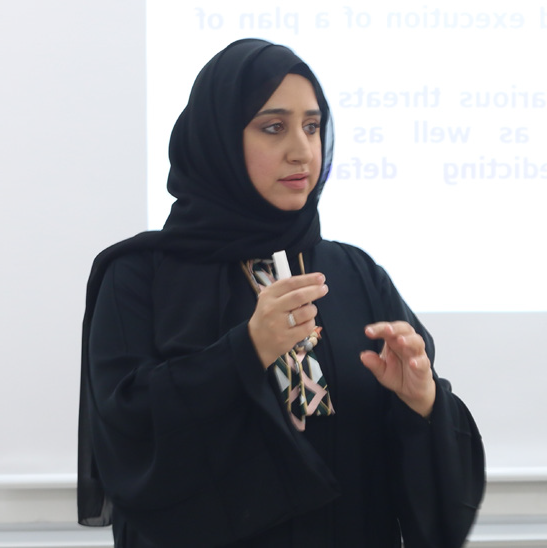
DR FATIN ZADJALI
ACTING ASSISTANT DEAN AND HEAD OF ISLAMIC FINANCE AT COLLEGE OF BANKING AND FINANCIAL STUDIES OMAN
Ever since the inception of Millennium Development Goals (MDG’s) and their subsequent transformation in 2015 into Sustainable Development Goals (SDG’s), the world seems to be in a final countdown mode. The sense of urgency to take action and break inertia and stringency to achieve the sustainability agenda is justified. This is especially significant as, according to the World Bank 2020 report, the pandemic is estimated to push an additional 88-115 million people to extreme poverty. The coronavirus-induced economic disruption has crippled economies and created job losses in an unprecedented proportion.
Slogans of equality, justice and fairness were raised to generate support and relief for the marginalised groups, as high cost of funding, raw materials, reduced market access and limited access to financing adversely affected the sustenance and livelihood of many around the globe. Women and children have been the most affected by this economic stagnation. Today, women are breadwinners for their families and face additional challenges in finding new avenues for income. Besides, they are also expected to handle multiple tasks. Fortunately, multitasking has become a norm, mainly due to the adoption of new technologies and emergent tech-based financial platforms.
Islamic finance instruments are one such industry that is designed to generate justifiable profit and contribute to social prosperity and economic value. Women in Islamic Finance (WIS) have been instrumental in its development and progress throughout history. We have several examples of women entrepreneurs in Islam such as Sayyida Khadijah (May peace be on her soul) was a trader, Zainab Bint Jahsh was involved in retail, one of the wives of Omar Bin Al Khattab managed the household budget so well that caliphate Omar reduced his allowance to match her savings. This shows that women in Islam have played a pivotal and active role in their households as well as the community and market.
Islamic finance is established on the principle of trade and sale (Allah permitted trade and prohibited riba). Moreover, sale contracts are built upon solid Shari’a principles. Shari’a constitutes the way of life a Muslim has to follow to achieve The Creator’s pleasure and abstain from His displeasure. The objectives of Shari’a (Maqasid al- Shari’a) are the preservation of five significant dimensions, life (al-nafs), religion (al- deen), intellect (al-aql), wealth (al-mal), and lineage (al-nasl). Protection of wealth is a crucial objective of Shari’a.
In addition to their economic contributions, women are supposed to raise children according to the principles of Islam. It is one of the responsibilities of women for creating leaders for the future. Raised on the teaching of the Quran and Sunnah, these children respect and follow in the footsteps of their mothers, inadvertently following the lead of a women. Today, the perfect example of women leadership is celebrated in the crowning of Mama Samia of the Republic of Tanzania.
Women entrepreneurs have shown dynamism in trade and sales. Their tenacity has been remarkable during the current economic crisis that has significantly jeopardised the sustenance of societies. However, it is worth noting that the economic crisis’s impact has been proportional to its capacity. Studies show that innovative and proactive businesses exhibited more resilience in extremely harsh market conditions. Smaller enterprises turned out to be more flexible than larger ones, as they could easily adjust to the economic downturn and were able to find opportunities in market niches.
WOMEN IN ISLAMIC FINANCE (WIS) HAVE BEEN INSTRUMENTAL IN ITS DEVELOPMENT AND PROGRESS THROUGHOUT HISTORY – WE HAVE SEVERAL EXAMPLES OF WOMEN ENTREPRENEURS IN ISLAM
Women across the globe can contribute significantly in these times of crisis. We seldom see women as corporate leaders because corporations are male-dominated and women tend to be at the bottom of the hierarchy. Women, however, could turn the table around and explore avenues such as taking leverage ofsmall establishments. Unlike otherwomen, Muslim women can use Islamic finance instruments to achieve the required targets. Take, for example, a tech start-up to make environmentally friendly packaging. A classic mudharaba arrangement built on a risk-sharing basis can easily finance this start-up.
Islamic finance needs leadership and a belief that it is here to stay. We would have to simplify the procedures and disentangle taboos. I recall that once I was invited as a jurist for a pitching competition for the Women In Tech (WIT) project. Among the projects was a donation application to post unwanted items, and another project was on recycling denim and making them into carrying bags. It made me realise that a woman is a leader by design. She is creative and can think beyond and outside the box and is able to manage anything because leadership begins at home.
Financial technology solutions are not enough if they are not aligned with a value proposition to serve an impending social and economic issue. Value-based intermediation (VBI) is a concept introduced to highlight contribution and value addition for the stakeholders instead of only focusing on deliveringfor the shareholders. In layman term, VBI constitutes serving the community while making justifiable profit without contributing adversely to the environment. Because of her nature of giving and caring, a women entrepreneur is expected to lessen the burden of pollution on the environment.
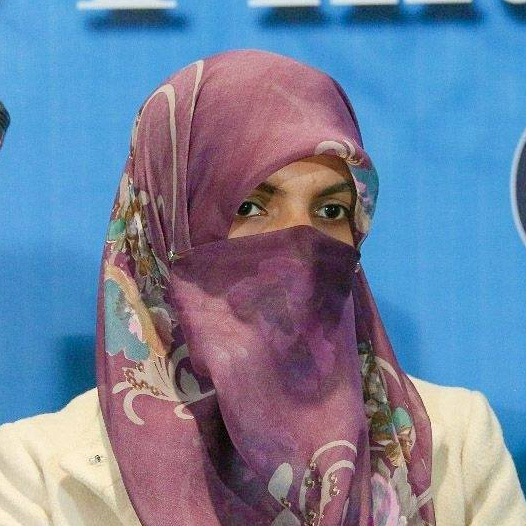
HADIA SAQIB HASHMI
RESEARCH ASSOCIATE INTERNATIONAL CENTER FOR RESEARCH IN ISLAMIC ECONOMICS, ICRIE
In 2015 the United Nations General Assembly developed the Sustainable Development Goals to remove poverty, protect the environment and ensure that people live a prosperous and peaceful life, to be achieved by 2030. Considering that uneven distribution of opportunities and restriction to women’s development has led to economic stagnation and stymied development in more than half of the world, a detailed set of objectives were created under SDG-5 on
gender equality. There are various tones and tenor to gender quality, and one among them is women empowerment. So far, many definitions of women empowerment have been coined. The one the UNICEF has identified states: “Empowerment of women and girls concerns women and girls gaining power and control over their own lives. It involves awareness-raising, building self-confidence, expansion of choices, increased access to and control over resources and actions to transform the structures and institutions which reinforce and perpetuate gender discrimination and inequality.”
It is pertinent to mention that Islam encourages women to engage in socio-economic activities and have financial independence. Before the advent of Islam, we find several women who had large businesses; one among them was Hazrat Khadija, the wife of Prophet Muhammad (PBUH). Others were Umm Al-Munzir Bint-E-Qais, Asmah binti Makhzemah bin Jandal. These women had no problem in pursuing their economic activities when Islam arrived. Later during Hazrat Umer’s reign a businesswoman Al-Shifa bint e Muawiz was elected commandant of the Madinah market. Some other women, such as Khaula, Lakhmia, Thaqafia, and Bint Makhramah, traded in oriental oil-based perfumes.
Based on the principle of economic emancipation, the scope of the Islamic banking and finance is large enough to help women participate actively in economic activities, which can bring multiple-digit improvement in the total productivity of a given country. Already professionally sound women occupy a large swath of Islamic banks. One of the pieces of evidence in this regard is the WOMANi award that Cambridge IFA gives to the top 500 women working in the Islamic banking and finance industry.
It does not mean that women have achieved the citadel of success and that their struggle against gender discrimination has ended. In fact, for her, the pursuit of professional life without much hassle and on equal footing is still a far-fetched dream. She is forced to compromise at every step, whether it is the salary she is offered, which does not always match her skills or the legal and customary hurdles she faces when claiming her property rights.
The statistics gathered by the UN shows that out of 1.3 billion poor people in the world, 70% are women. Therefore, women will have to be liberated, empowered, and emancipated for their respective countries’ economic development. In Muslim societies where population growth and poverty are high, there is a higher need to create solutions to remove gender disparity and engage women in developmental agenda. In this scenario, the Islamic finance industry has a role to play. Islamic banks, moving beyond the theory of natural gender, should design products reflecting women needs. Women demographics should be clearly defined while making a business model because so far, the superficially tailored women-based products have failed to enhance women empowerment.
Here, the role of technology has to be realised by the Islamic financial industry. A large number of women have already
benefited from technology to acquire financial literacy, education, awareness of their rights, and so on. The emergence of FinTech is an excellent development in the banking industry. The FinTech platforms and the Islamic banks should join hands to develop avenues for women empowerment. Several FinTech solutions have been offered in different countries to attract women. Islamic crowd-funding is an excellent example in this regard.
Islamic social finance that includes zakat, waqf, qard al hassan and microfinance has great potential to alleviate poverty and in the creation of employment. Islamic banks, social media, and Islamic microfinance institutions can join hands to give financial solutions to women for their business needs. Multiple solutions are possible by combining and blending commercial and social tools such as lumping zakat with micro financing and waqf with sukuk, etc.
Women empowerment is not an issue for women alone; in fact, this social dilemma has enormous implications for society. Empowered women and girls contribute to their families, communities, and countries, creating a ripple effect that benefits everyone. Islamic banking and finance industry can set an example for the whole world by working on this noble agenda of women empowerment with true letter and spirit.
DURING HAZRAT UMER’S REIGN A BUSINESSWOMEN AL-SHIFA BINT E MUAWIZ WAS ELECTED COMMANDANT OF THE MADINAH MARKET; SOME OTHER WOMEN, SUCH AS KHAULA, LAKHMIA, THAQAFIA, AND BINT MAKHRAMAH, TRADED IN ORIENTAL OIL- BASED PERFUMES
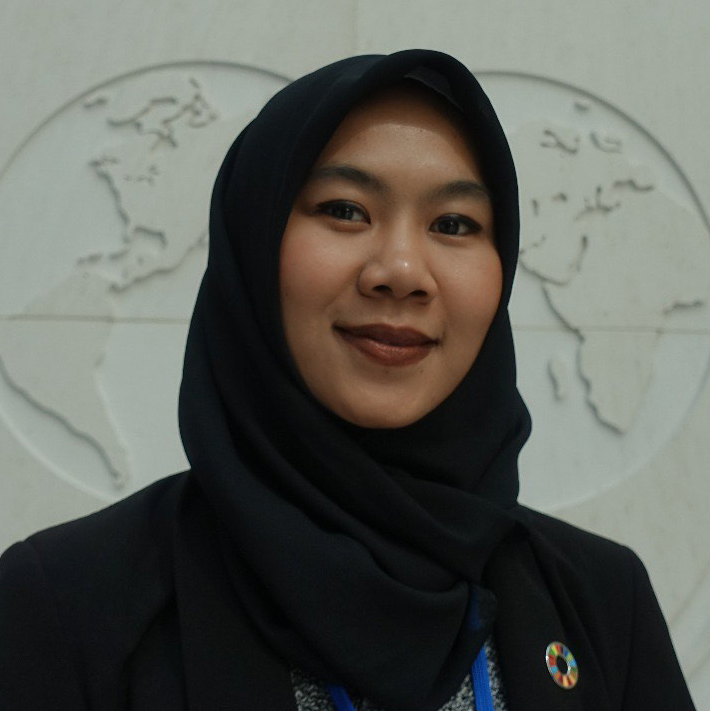
MEIKE RACHMANA
PUBLIC POLICY RESEARCHER & CORPORATE LEGAL
Women generally live in a vulnerable position worldwide. They are exposed to multiple hazards that include gender discrimination, violence, and unequal access to opportunities and resources. Around for centuries these issues have attracted sparse or no improvement at some places until the global leaders decided to generate universal commitment and energy to end gender inequality. The huddle resulted in including women empowerment as one of the objectives of the Sustainable Development Goals and its predecessor the Millennium Development Goals. After the onslaught of COVID-19 pandemic the world is once again faced with a spike in gender inequality with the prospect of disempowering women of even their fundamental rights.
The pandemic has affected every area of life and the hardest among them has been the financial sector. The policy of lockdown, public health crisis, and economic instability rendered innumerable workers jobless with a risk of falling into poverty. According to McKinsey’s calculation, women are 1.8 times more vulnerable than men to lose their job in this scenario. Although women make up 39% of the global employment, they account for 54% of overall job losses. It is so because 65% of women are employed in the informal sector, as stated in a United Nations report.
Besides employment loss, violence against women has also risen drastically during the pandemic. People are worried of losing the improvement earned, so far, in gender equality and women empowerment, which might take us centuries back to where we began. Therefore, today reinforcing gender equality and women empowerment has become even more essential to ensure that the milestones enunciated in the SDGs are achieved in the stipulated time frame. Various researches have corroborated the fact that sustainable development cannot be achieved without women empowerment. Generally, what is suitable for gender equality is also good for the economy and society.
Numerous initiatives have been taken to help women have freedom of choice and control over their lives. One of the significant catalysts in this regard was the provision of equal education. Another area that made an equal difference was giving women access to banking and financial institutions. It was a challenge of insurmountable nature as most women globally work in the informal sector, which usually deprived them from access to social protection as well as the banking system. Not only did women lacked the confidence of accepting themselves as equal members of society, the banks also had difficulty attracting women as their clients because of a narrow understanding of their needs, and complicated documentation and paperwork involved in accessing financial products on offer.
The concept of mutual assistance, cooperation, inclusivity and social justice inherent in Islamic banking and finance can bridge the gap between women and the banking and financial sector. Already many banks have implemented them. For example, the application of Takaful in a financial product (e.g., insurance) is based on the principles of mutual assistance (Taawun) and donation (Tabarru). The idea is to foster a sense of unity and cooperation among the individuals for a collective solution to problems and issues. Similarly, the Islamic banking micro- financing system called Baitul Maal Wat Tamwil (BMT) plays a significant role in giving women the power to make purchasing decisions to buy assets. A combination of Amil (striver) and Tamil (capital stock financing) the BMP is actively fulfilling women’s financial needs to improve their quality of lives. The platform has also facilitated women’s rapid participation in banking and finance after equipping the former with the tools they needed to access formal banking and financial system. By 2018 Indonesia had established 4,500 BMT units.
PEOPLE ARE WORRIED OF LOSING THE IMPROVEMENT EARNED SO FAR IN GENDER EQUALITY AND WOMEN EMPOWERMENT, WHICH MIGHT TAKE US CENTURIES BACK TO WHERE WE BEGAN; THEREFORE, TODAY REINFORCING GENDER EQUALITY AND WOMEN EMPOWERMENT HAS BECOME EVEN MORE ESSENTIAL
Islamic banking and finance is not only about enforcing religious values or preferences, but it is also about how society distributes power among its individual without gender discrimination. This concept is mainly in line with women empowerment based on mutual assistance and cooperation. Generally, these values can benefit the entire society while contributing to global development for achieving SDGs. In the long run, Islamic banking and finance’s success will depend on the opportunities it will explore to bring people together as one community pursuing a common cause and purpose.
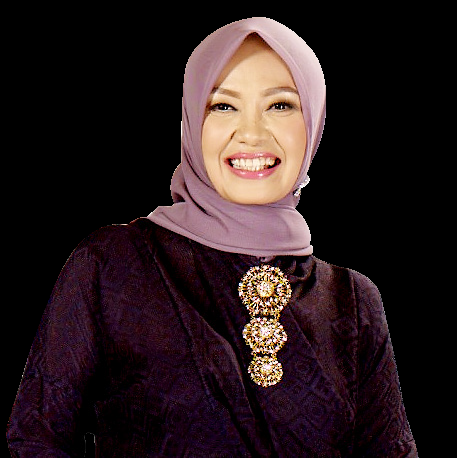
RATIH RACHMAWATY
CHIEF EXECUTIVE OFFICER AMAAN
“Unbankable” is commonly used to describe the bottom-of-the-pyramid segment who do not use the financial services banks offer and prefer to manage their finances through cash transactions. This idea of “unbankable” is a lame excuse. It is, in fact, the responsibility of banks – through innovative products, people, and processes – to make this massive and underserved population bankable.
I believe banks, financial institutions and microfinance are the catalyst and can assist in achieving the SDGs. When a poor person is given an investment loan for business, he/she is allowed to increase his/her income and buy house, food, education, and healthcare services for himself/herself and his/her families. The question is: how can we provide finances to a poor man that he could prudently invest in commercial activities? My experience in Indonesia’s Syariah banking tells me that micro-entrepreneurship for women is the entry point to getting finances. This is for two reasons. Firstly, women have exhibited lower credit risk than men, and their management skills result in profitable and sustained business ventures. Secondly, women are embedded in all areas of society – many hold multiple roles of daughter, wife, entrepreneur, and community leader, and by empowering women, we are ultimately empowering their families and communities.
WOMEN ARE EMBEDDED IN ALL AREAS OF SOCIETY – MANY HOLD MULTIPLE ROLES OF DAUGHTER, WIFE, ENTREPRENEUR, AND COMMUNITY LEADER, AND BY EMPOWERING WOMEN, WE ARE ULTIMATELY EMPOWERING THEIR FAMILIES AND COMMUNITIES
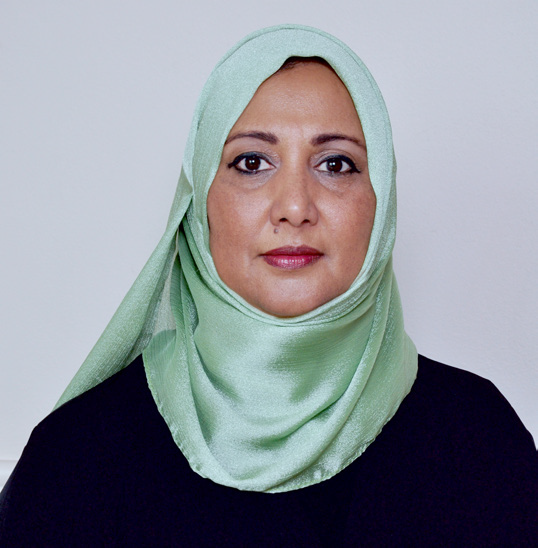
YASMINA FRANCKE
CHIEF EXECUTIVE OFFICER
SOUTH AFRICAN NATIONAL ZAKAH FUND (SANZAF)
Gender inequality is still prevalent in many communities across the globe. Women and girls continue to share a disproportionate burden of poverty, hunger, inequality and violence, while gender imbalance persists within a vicious cycle of pain and indignity. Although several international laws have been passed and many policy measures have been adopted, gender equality remains one of the most pressing social, economic and political issues affecting modern society.
A MULTI-FACETED APPROACH
Identified by the United Nations as the Sustainable Development Goals (SDGs), women’s equality and empowerment are among the 17 SDGs that seek to end all forms of discrimination against women and girls everywhere. Gender equality encompasses women’s rights to access economic resources, financial services, justice, ownership and control over property, inheritance, natural resources, and more importantly, to get equitable pay and representation at the boardroom table. However, these goals would fail to reach any far without considering the complex and multifarious nature of a gender-equal world.
Professor Naila Kabeer from the London School of Economics Department of Gender Studies defines women empowerment as: “A process by which women gain the ability to make and enact strategic life choices. Critically, women are the agents of the change process”. Prof Kabeer contends that to be truly empowered, women must have the rights and freedom to make choices and decisions for themselves, their families, communities and environment.
Engaging women and girls in sustainable development requires a change in attitudes and behaviours towards women and girls. Societal changes are required to challenge deeply-rooted norms and expectations about power and privilege, and to create an enabling environment for gender-based activism to find expression.
IT STARTS WITH FINANCIAL INCLUSION
According to Leora Klapper, Lead Economist at the World Bank and Founder of the Global Findex database, achieving any UN SDGs – poverty eradication, gender equality and quality education – begins with having a financially inclusive world.
Financial inclusion is a critical component of social inclusion and represents a fundamental global development agenda. In this regard, women’s access to financial services rightfully ranks as one of the leading sustainable development targets, forcing many countries, including Islamic countries, to adopt financial inclusion strategies.
Islamic finance can contribute meaningfully to the global reform agenda defined in SDG-5 concerning women empowerment. By its inherent nature, Islamic finance principles are rooted in social justice, inclusion, and sharing of resources to achieve prosperity and social well-being for all. The risk-sharing instruments of Islamic finance, such as musharakah and murabaha, and its social redistributive mechanisms like zakat, sadaqa and waqf, can undoubtedly bring positive and sustainable changes.
As Islamic banking and finance become increasingly widespread in the Middle East, Southeast Asia and North Africa, there are significant differences in financial inclusion and integration of women across these countries.
Whilst Malaysian and Indonesian women are making significant strides in Islamic finance, women in the Middle East have only started to see the tides changing. The situation in the Northern regions of Africa, India, Pakistan and Bangladesh is not different. It is clear that women’s access to Islamic finance varies depending on geographic spread. Islamic finance’s urbanisation also poses a challenge for its effectiveness as a valuable tool to achieve the SDGs. Rural communities, suffering significantly more from mainstream economic exclusion and deprivation, are further denied the offering that has the potential to take care of their needs.
Whilst the growth in FinTech can serve as a bridge to overcome this challenge, digital adoption across the globe is still slow and has spurred only recently because of the COVID-19-induced lockdown and social distancing. Digital finance has the potential to transform the economic prospects of women because of its ability to address a number of the daily restriction women from various backgrounds and cultures face – the limitation on free movement, the demands of family life and even resistance to engage face-to-face with males in financial institutions. However, it is not without risks. Hacking, identity theft and aggressive marketing are but some of its ills.
Along with the generally low public awareness levels on financial and technological literacy, this consumer base’s vulnerability is further compounded.
REPRESENTATION OR QUOTAS FOR FEMALE LEADERS
In September 2020, Reuters reported that women are sorely underrepresented in financial services, focusing on the Gulf Arab region. Some may challenge this point with the growing list of women in senior positions ranging from CEOs of leading banks to presidents of FinTech companies and chief advisers to the Islamic banks. Change is undoubtedly on the horizon, but there is caution against the achievement of quotas on leadership boards and advisory councils, if it serves purely as tokenism and a scorecard accelerator.
In other research done by the Boston Consulting Group, it is reported that women are generally offered ‘dumbed down’ products when, in reality, they want the same products as offered to men. Women want their products and investment options developed in a way that acknowledges their diversity and reflects their values and preferences, such as higher female life expectancy, interruptions in careers due to family planning so on and so forth.
As long as financial services fail to embrace these differences and do not strive to be truly inclusive and accessible, female leadership participation will remain a lost opportunity, and the industry will continue to under-served women.
ISLAMIC FINANCE SERVING THE NEEDS OF WOMEN
Islamic finance can be one of the most powerful, liberating and enabling tools to drive women empowerment. At this critical juncture when Islamic finance is coming into its own, it must seek to balance supply-side factors with consideration for the specific demand from its various stakeholders, with a particular focus on the unique needs of women, from those in rural communities to the one urbanised and to the ones challenging the glass ceiling.
Differentiating its services with exclusive offers has already attracted many women – both Muslim and non-Muslim – and is setting Islamic finance apart to reflect the sensitivity towards cultural and religious dynamics. If Islamic finance continues on this trajectory, it will be well placed to provide access to financial services to businesses and communities in a sustainable way. Doing so will assist in achieving SDG-5 and also many other SDGs where women, in their role as mothers, teachers, caregivers and nurturers, can play a pivotal role for sustainable development in the true sense of the word.
FINANCIAL INCLUSION IS A CRITICAL COMPONENT OF SOCIAL INCLUSION AND REPRESENTS A FUNDAMENTAL GLOBAL DEVELOPMENT AGENDA – IN THIS REGARD, WOMEN’S ACCESS TO FINANCIAL SERVICES RIGHTFULLY RANKS AS ONE OF THE LEADING SUSTAINABLE DEVELOPMENT TARGETS
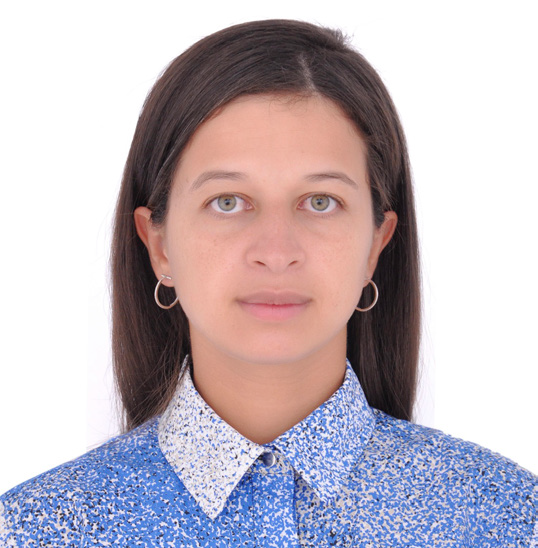
ZAINEB SEFIANI
FOUNDER & DIRECTOR CARRERA LEARNING
Over the last few decades, we have seen a handful of Islamic financial services firms having women executives. Alliance Islamic Bank, RHB Islamic International Asset Management, Bank Rakyat, Aseel Islamic Finance and DDCAP are among those that have assigned C-level positions to their women employees. There are also a few female Shari’a scholars, but these remain significantly underrepresented.
Countries like Malaysia and Indonesia made an effort to promote female Shari’a scholars. Two female Shari’a scholars sit on Malaysia’s Shari’ah Advisory Council (SAC) Board, alongside eight male Shari’a scholars. The Middle East has made a rare foray into increasing the participation of women scholars. We find two women sitting on company boards and working as CEOs in Bahrain and Kuwait.
There is a clear need to improve gender diversity in Islamic banking and finance. Let us first look at what initiatives are already in place to empower women and achieve gender balance.
WOMANi is an initiative of Cambridge IFA, and it aims to promote gender equity in the corporate sector, government agencies and departments, and in the social sector and philanthropy. Last year’s report featured the 500 most influential women in Islamic banking and finance. The goal of WOMANi is to increase this list to 1000 and beyond in the next couple of years.
The Islamic Development Bank (IsDB) has initiated several programmes and operations to contribute to women empowerment. In late 2020, IsDB invited tenders for Consultancy Services for “Enhancing Women’s Financial Inclusion through Islamic Finance.” Under its Women Entrepreneurs Finance Initiative, the World Bank has allocated US$32.2 million to IsDB’sfor its “Business Resilience Assistance for Value-adding Enterprises for Women (BRAVE
Women) program”. BRAVE’s goal is to increase business growth opportunities for women entrepreneurs in conflict areas such as Yemen and Mali.
Despite this progress, how Islamic banking and finance can improve gender diversity and women empowerment still need to be looked at closely.
Several Islamic banking and finance areas can be used to empower women and achieve the United Nations Sustainable Development Goal-5 (SDG-5) i.e., gender equality and women empowerment. SDG-5 has 9 targets and 14 indicators. One of the targets is ensuring women participation and giving them equal opportunities to develop leadership roles at board level.
FINANCIAL INCLUSION
As a first step towards women empowerment and gender balance, the Islamic financial institutions should take strategic decisions to increase their women workers’ financial inclusion. A few banks have established women-only branches or are offering products tailored for women only. For instance, the Dubai Islamic bank has dedicated branches for women.
MICROFINANCING TO ENCOURAGE WOMEN ENTREPRENEURS
On the same lines, Islamic finance institutions should invest more in women-led or women-run enterprises, financial service providers and FinTech. A good idea could be to start Islamic microfinancing to support women-led enterprises.
EDUCATION AND MENTORSHIP PROGRAMMES
There is a correlation between education and women achieving leadership roles. We need non-traditional avenues to groom women for the future. The Cambridge-Edbiz Group of Companies has developed a unique idea in this regard. The WOMANi Talent Development Programme, as part of the overarching WOMANi Fund, is an investment fund of proposed US$100 million, with an exclusive focus on feminal commercial opportunities. WOMANi TDP aims at selecting 20 young women in the age bracket of 16-20 years every year to spend US$1 million on each of them over 10 years to make them women of their dreams.
ACCESS TO INHERITANCE
One of the targets of SDG-5 is to “Undertake reforms to give women equal rights to economic resources, as well as access to ownership and control over land and other forms of property, financial services, inheritance and natural resources, in accordance with national laws”. Shari’a laws on inheritance will have to be reinterpreted to align them with the changing circumstances.
The Islamic banks and financial institutions should take the lead in giving women the power that makes them productive only for the sector but also for the entire society.



